PCC puts on 26th annual Moanikeala Hula Festival
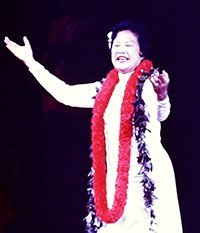
Sally Moanikeala Wood Naluai “Aunty Sally”
Following a brief Hawaiian flag-raising ceremony, village “chief” Kaipo Manoa explained the festival honors the PCC’s original kumu hula, Aunty Sally Moanikeala Wood Naluai.
“I was really surprised at the spirit of Aunty Sally that was here. I think there were some things that were done spontaneously because everyone could feel her spirit here,” he said. “For example, I liked the way Aunty Joanie just started dancing. That was a once-in-a-lifetime treat.”
The Polynesian Cultural Center originally started the annual special event as a competition, which more recently became a hō’ike or exhibition by various hālau who had been invited to share their talents.
In introducing the first group, Manoa pointed out his own PCC Hawaiian villagers would perform under the direction of their current kumu, Uncle Keith Awai using hula originally choreographed by Aunty Sally.
“They do this not just because this is their job, but this is where they love to be. It’s not hard to love to be in this village,” said Sia Tonga, who emceed the program. Tonga also explained that Awai “was a haumana or student of Aunty Sally. We want to thank Uncle Keith for keeping those songs and dances alive.”
“Though I am of Tongan descent,” the emcee continued, “I was born here on this beautiful island and my heart will always be Hawaiian. I was raised by a mother who loved hula and always dreamed of coming to the Polynesian Cultural Center. I may not have a hula genealogy like the kumu who are about to join us, but I feel very honored to be a part of the legacy of this place. Aunty Sally will always be remembered, because many of her students or haumana continue to carry on her legacy.”
In addition to Awai in the Hawaiian Village, Tonga said these include PCC Theater Director Aunty Ellen Gay Dela Rosa, recently retired Hawaiiana expert Cy Bridges, Aunty Sunday Kekuaokalani Mariteragi, and others.
In addition to being her students, Dela Rosa and Mariteragi are also nieces of the late Aunty Sally. She encouraged Mariteragi, who is largely responsible for initiating the PCC’s Moanikeala Hula Festival 26 years ago, to start her own halau, Napuananionapalionakoolau [from her middle name] in 1981. Mariteragi now teaches her students at the Cultural Center, where visitors from around the world are welcome to watch the process of how keiki in the community of Laie acquire hula skills.
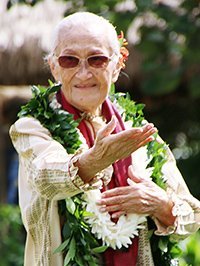
Aunty Joanne Lindsey, Kumu Hula
“This festival would not be as successful as it is without the participation and the love and the attendance of many halau where it is taught. I think it is appropriate that we start with hula ‘royalty,’” Tonga said, referring to Aunty Joane S. Lindsey and her hula studio from the Pearl City, Oahu area, “who have supported us for decades.”
“Whether a competition, or a non-competitive festival or a hō’ike — like today, Aunty Joanie is here; and we can’t thank her enough, for she is 87 years old. Look at her. When you watch her walk, she is still more graceful than anyone I know. Aunty Joanie, we love you. Thank you so much for being here.”
Ka Pa Nani o Lilinoe, a halau taught by Lindsey’s daughter, Lilinoe Lindsey, and Aunty Sunday’s halau followed. Before they began, Mariteragi said, “Aunty Sally is smiling today.” Her group, which includes all ages, performed several numbers that Aunty Sally used to teach years ago, including Waimea Lullaby and Baby Dolly, the latter written by the late Aunty Genoa Keawe. “Aunty Sally and Aunty Genoa were friends,” Mariteragi said, “and many of Aunty Genoa’s songs were written for children.”
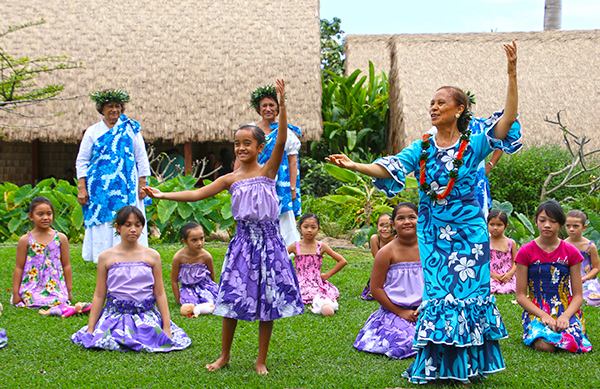
Aunty Sunday and halau dancers
Introducing another number, Mariteragi said Elvis Presley originally did Rock-a-hula in the 1963 movie Blue Hawaii. When Elvis spent a week at the Polynesian Cultural Center in the summer of 1965 filming part of his 1966 movie Paradise Hawaiian Style, Mariteragi recalled Elvis asked Aunty Sally — whom he originally met when her brother, the late Sam Kekuaokalani, a Honolulu Police Officer, provided security during the filming of Blue Hawaii — to choreograph a song on the spot at the PCC. “Aunty Sally said, sure,” coming up with This is My Heaven.
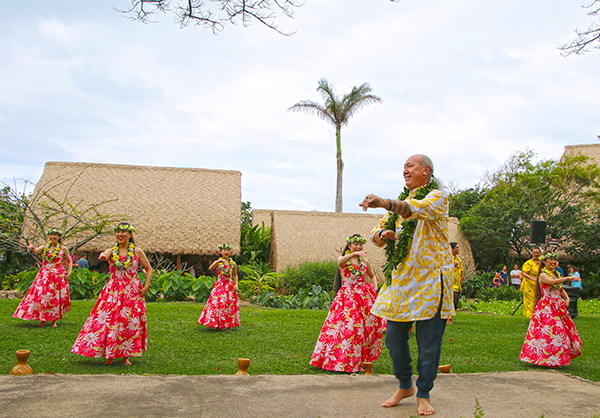
Halau from Nagoya, Japan
Next up: Members of Puanani Aloha, a halau from Nagoya, Japan, led by sensei Yuko Kawamoto, made their fourth appearance in the Moanikeala festival. Noted kumu hula Frank Kawaikapuokalani Hewett joined the group and others as they performed Papalina Lahilahi. They were followed by Hu’i Park’s Hula Studio from Honolulu, led by kumu hula Corrine “Pumps” Park-Chun. Tonga explained Park-Chun’s mother had actually been “very good friends with Aunty Sally, and we’re very thankful for their support over the years.”
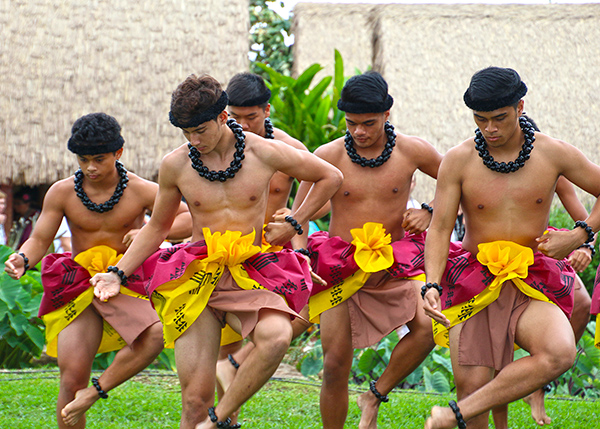
Men of Kawai’ulaokala
As a change-up to the preceding hula auana or modern style of Hawaiian dance up to that point, Hui o Na ‘Opio and the Men of Kawai’ulaokala — based at St. Louis High School in Honolulu under the direction of kumu hula Keli’i Puchalski — performed several numbers in the lively kahiko or ancient style. One of their numbers, he informed us, took first place in the 2015 high school hula competition.
“This was magnificent,” Sia Tonga responded. She also pointed out that two of the dancers “are young men who have grown up in our town” — Malik Ava, a fourth-generation member of the Laie Galea’i family, and Kaluna Nihipali, whose [late] grandfather, David Kekuaokalani, is a nephew of Aunty Sally. “Both of them have grown up working here at the Polynesian Cultural Center,” she said.
For the final performances, Hawaiian Villager Naauao Pane’e said, “It’s only fitting that under the direction of kumu hula Kela Miller we present Hula Halau O Kekela from Laie.” Miller, one of the original PCC dancers in 1963, was also a student of the late Aunty Sally.
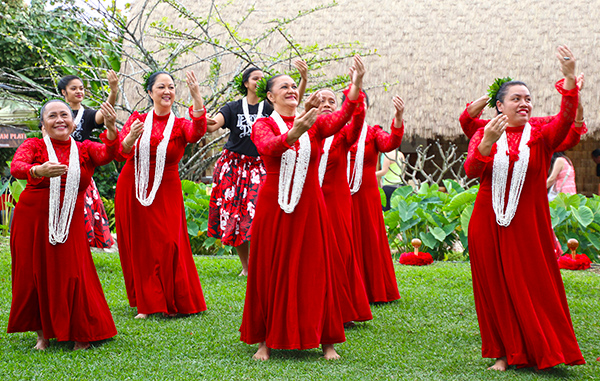
Hula Halau O Kekela
“We’re so glad that we could come. Our ladies come from all the way down to Kaaawa to Kahuku, and we’ve also included our young ladies from the Kahuku High School Polynesian Club,” Miller said. Among their numbers, the group performed Nani Laie, written by Miller’s great-grandmother about the beauties of Laie.
Story and images by Mike Foley
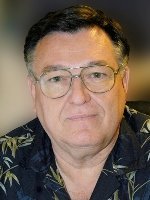
Mike Foley, who has worked off-and-on
at the Polynesian Cultural Center since
1968, has been a full-time freelance
writer and digital media specialist since
2002, and had a long career in marketing
communications and PR before that. He
learned to speak fluent Samoan as a
Mormon missionary before moving to Laie
in 1967 — still does, and he has traveled
extensively over the years throughout
Polynesia and other Pacific islands. Foley
is mostly retired now, but continues to
contribute to various PCC and other media.

Recent Comments